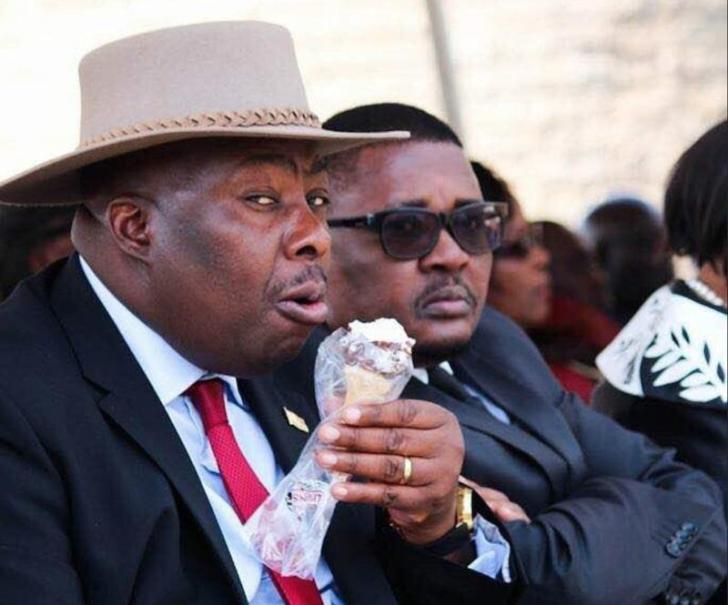News / National
G40 haunts Mnangagwa's Zanu-PF
20 Jan 2025 at 10:29hrs |
0 Views

Zanu-PF is mulling a policy on social media to curb the influence of its exiled members in the looming battle over President Emmerson Mnangagwa's succession, it has emerged.
The plan was disclosed by Zanu-PF commissar Munyaradzi Machacha while addressing party officials at a provincial co-ordinating committee (PCC) meeting held in Bindura on Friday.
Machacha expressed concerns over the growing influence of social media, particularly how it has become a platform for inflammatory debates originating from South Africa and fueled by individuals aligned with the G40 faction.
He highlighted the involvement of former Local Government minister Saviour Kasukuwere and external forces attempting to influence events in Zimbabwe through proxies as a serious concern. Inside sources who attended the meeting disclosed that Machacha specifically mentioned Kasukuwere's role in spreading dissent from his base in South Africa.
Kasukuwere, a key leader of the G40 faction, fled the country after the faction was defeated in a coup in November 2017. Other former ministers, including Walter Mzembi, Jonathan Moyo, and Godfrey Gandiwa, also went into exile following the fall of the G40.
Last year, Kasukuwere was barred by the courts from contesting against Mnangagwa in the August 2023 elections. Since then, he has been a vocal critic of Mnangagwa on social media, opposing the Zanu-PF leader's loyalists' push to amend the constitution and extend his term limit to 2030.
Mnangagwa's current term ends in 2028, but his loyalists have been advocating for an extension despite growing resistance both within and outside the party.
Machacha told the ruling party officials that for Zanu-PF to achieve unity, it would introduce a policy to control party members from expressing contradictory positions on certain matters via social media.
This is not the first time such a development has been hinted at. The party has been contemplating a social media policy since the late former President Robert Mugabe was in power.
Last year, senior party official Patrick Chinamasa mentioned that the party was considering a policy to "insulate party leadership" from dissenting voices on social media.
Several party officials have already faced suspension in Masvingo province for allegedly insulting party leadership in WhatsApp groups, although their suspension is closely linked to their opposition to the ED2030 project, supporting Vice-President Constantino Chiwenga to take over in 2028.
The plan was disclosed by Zanu-PF commissar Munyaradzi Machacha while addressing party officials at a provincial co-ordinating committee (PCC) meeting held in Bindura on Friday.
Machacha expressed concerns over the growing influence of social media, particularly how it has become a platform for inflammatory debates originating from South Africa and fueled by individuals aligned with the G40 faction.
He highlighted the involvement of former Local Government minister Saviour Kasukuwere and external forces attempting to influence events in Zimbabwe through proxies as a serious concern. Inside sources who attended the meeting disclosed that Machacha specifically mentioned Kasukuwere's role in spreading dissent from his base in South Africa.
Kasukuwere, a key leader of the G40 faction, fled the country after the faction was defeated in a coup in November 2017. Other former ministers, including Walter Mzembi, Jonathan Moyo, and Godfrey Gandiwa, also went into exile following the fall of the G40.
Last year, Kasukuwere was barred by the courts from contesting against Mnangagwa in the August 2023 elections. Since then, he has been a vocal critic of Mnangagwa on social media, opposing the Zanu-PF leader's loyalists' push to amend the constitution and extend his term limit to 2030.
Mnangagwa's current term ends in 2028, but his loyalists have been advocating for an extension despite growing resistance both within and outside the party.
Machacha told the ruling party officials that for Zanu-PF to achieve unity, it would introduce a policy to control party members from expressing contradictory positions on certain matters via social media.
This is not the first time such a development has been hinted at. The party has been contemplating a social media policy since the late former President Robert Mugabe was in power.
Last year, senior party official Patrick Chinamasa mentioned that the party was considering a policy to "insulate party leadership" from dissenting voices on social media.
Several party officials have already faced suspension in Masvingo province for allegedly insulting party leadership in WhatsApp groups, although their suspension is closely linked to their opposition to the ED2030 project, supporting Vice-President Constantino Chiwenga to take over in 2028.
Source - the standard
Join the discussion
Loading comments…

























